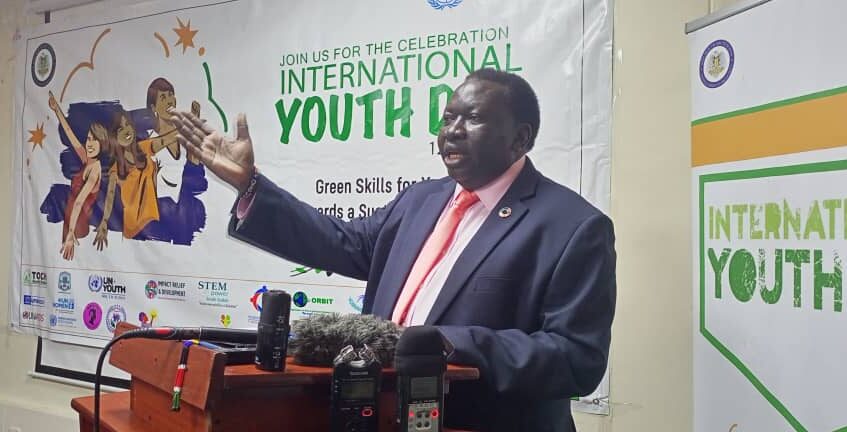
Joseph Africano Bartel, Undersecretary - Ministry of Environment and Forestry speak during a press conference. (Photo: Charles Wote)
South Sudan’s Environment Ministry says the country will require 100 billion U.S. dollars to mitigate and adapt to the impact of climate change in 27 years’ time.
Joseph Africano Bartel, the ministry’s undersecretary, said the government has developed a National Determined Contribution (NDC) plan that focuses on the mitigation and adaptation of shifts in temperatures and weather patterns.
He said the NDC requires the country to introduce smart agriculture as part of its climate adaptation.
This will involve short-term crop rotation due to shifts in rain patterns which have resulted in drought and floods. Others include building water harvesting, the use of technology, and other methods to protect arable land against soil erosion.
The official said the government intends to adopt the plans of different sectors in the national budget to raise at least 20 billion dollars by 2050. He also said the government hopes to mobilize the other $80 billion from the international donors.
“For the NDC [National Determined Contribution] alone, we will require 100 billion dollars till 2050,” he said during a press conference to mark International Youth Day on Friday.
“What we are going to do as a government is now to take all the plans for different sectors and adopt them in our budget that alone will be able to make us as a country get at least 20 billion dollars by 2050.”
“And the remaining 80 billion, that is why we have to now go and request for funding from the international community and from the countries that have made a climate change a problem.”
Since 2009, global climate talks agreed on mobilizing $100 billion a year for developing countries to take climate action, both to adapt and cut emissions.
According to the United Nations Climate Action, the money is supposed to come from wealthier countries, through bilateral, regional, and multilateral channels, as well as the private funds generated by public interventions.
It adds that the $100 billion goal has not been reached and the distribution of funds has not been equitable.
In 2020, the Organization for Economic Co-operation and Development data revealed that developed countries provided only $83.3 billion, 8 percent of the total went to low-income countries and about a quarter to Africa.
Undersecretary Bartel said South Sudan eyes producing 3,000 megawatts of electricity power from renewable sources such as hydro, solar, wind, geothermal, and natural gas as part of mitigation.
This is in addition to planting 100 million trees in the next ten years to reduce dependence on forests for firewood and source of energy.
“In the mitigation, South Sudan is supposed to produce 3000 megawatts of power from renewable sources such as hydro, solar, wind, geothermal, and natural gas.”
“Because 99.9% of our population depend on forest for fuelwood, and charcoal as a source of energy, we think that we need to regenerate this forest by planting 100 million trees in ten years so every state and administrative area will plant 10 million each.”
Support Eye Radio, the first independent radio broadcaster of news, information & entertainment in South Sudan.
Make a monthly or a one off contribution.
Copyright 2024. All rights reserved. Eye Radio is a product of Eye Media Limited.